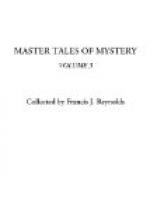Lord and Lady Bazelhurst, with the more energetic members of their party, spent the day in a so-called hunting excursion to the hills south of the Villa. Toward nightfall they returned successfully empty-handed and rapacious for bridge. Penelope, full of smouldering anger, had spent the afternoon in her room, disdaining every call of sociability. She had awakened to the truth of the situation in so far as she was concerned. She was at least seeing things from Shaw’s point of view. Her resentment was not against the policy of her brother, but the overbearing, petulant tyranny of her American sister-in-law. From the beginning she had disliked Evelyn; now she despised her. With the loyal simplicity of a sister she absolved Cecil of all real blame in the outrage of the morning, attributing everything to the cruelty and envy of the despot who held the purse-strings from which dangled the pliable fortunes of Bazelhurst. The Bazelhursts, one and all—ancestors thrown in—swung back and forth on the pendulum of her capriciousness. Penelope, poor as a church mouse, was almost wholly dependent upon her brother, who in turn owed his present affluence to the more or less luckless movement of the matrimonial market. The girl had a small, inadequate income—so small it was almost worth jesting about.
Here was Penelope, twenty-two, beautiful, proud, fair-minded, and healthy, surveying herself for the first time from a new and an entirely different point of view. She was not pleased with the picture. She began to loathe herself more than she pitied her brother. Something like a smile came into her clouded face as she speculated on Randolph Shaw’s method of handling Evelyn Banks had she fallen to him as a wife. The quiet power in that man’s face signified the presence of a manhood that—ah, and just here it occurred to her that Lady Bazelhurst felt the force of that power even though she never had seen the man. She hated him because he was strong enough to oppose her, to ignore her, to laugh at her impotence.
The smouldering anger and a growing sense of fairness combined at length in the determination to take her brother and his wife to task for the morning’s outrage, let the consequences be what they might. When she joined the people downstairs before dinner, there was a red spot in each cheek and a steady look in her eyes that caused the duke to neglect woefully the conversation he was carrying on with Mrs. Odwell.
Dinner was delayed for nearly half an hour while four of the guests finished their “rubber.” Penelope observed that the party displayed varying emotions. It afterward transpired that the hunters had spent most of the afternoon in her ladyship’s distant lodge playing bridge for rather high stakes. Little Miss Folsom was pitifully unresponsive to the mirth of Mr. Odwell. She could ill afford to lose six hundred dollars. Lady Bazelhurst was in a frightful mood. Her guests had so far forgotten themselves as to win more than a thousand dollars of the Banks legacy and she was not a cheerful loser—especially as his lordship had dropped an additional five hundred. The winners were riotously happy. They had found the sport glorious. An observer, given to deductions, might have noticed that half of the diners were immoderately hilarious, the other half studiously polite.




